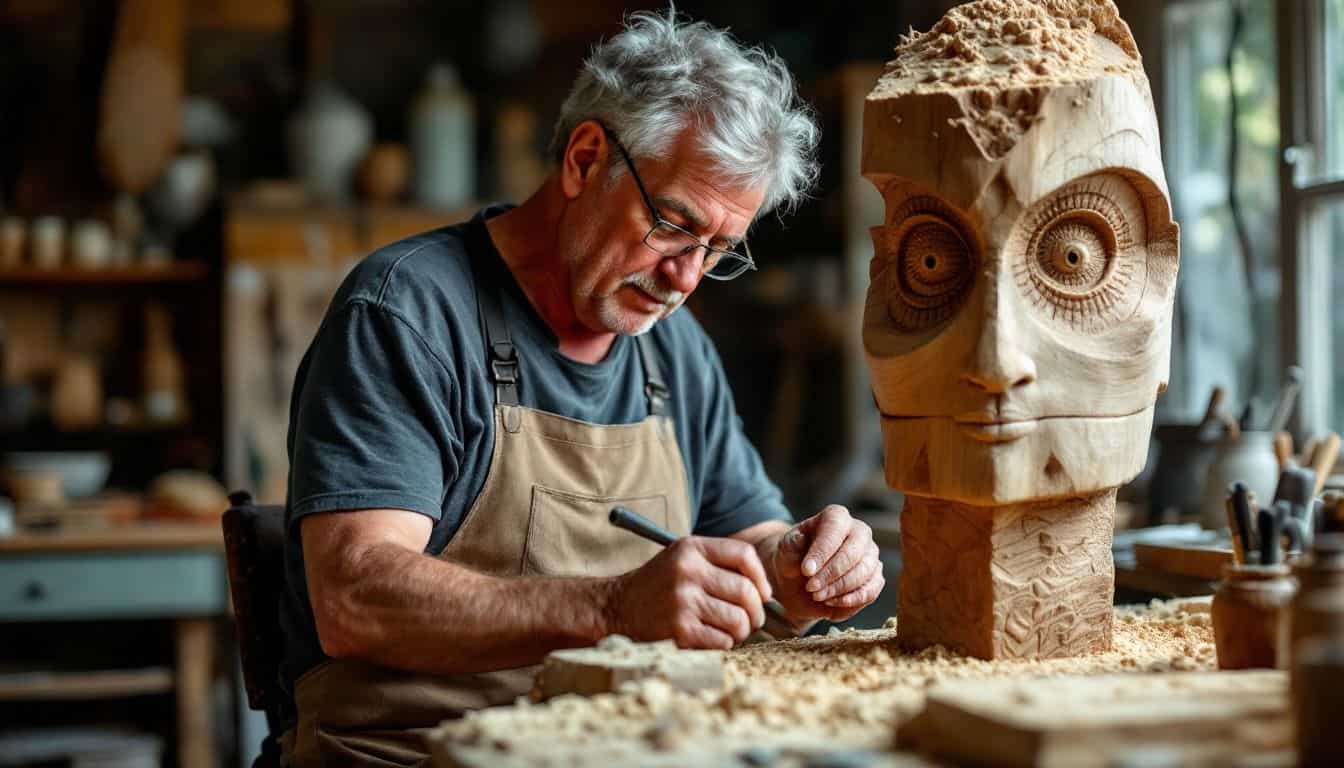Do you feel stuck in the same routine, looking for hobbies that require skill to help you grow? Studies show skilled pastimes boost mental wellness and improve your memory and creativity.
In this article, you’ll find 21 productive hobbies to enhance your mood, social skills, and physical fitness. Read on to finally discover a hobby worth your leisure time.
Key Takeaways
Creative activities like painting and sketching improve mental health—studies link these hobbies to greater self-confidence and improved life satisfaction.
Learning a new language takes roughly seven hours a week of practice, shows employers your self-discipline, and highlights your openness to other cultures.
Playing chess or other strategy games sharpens memory and concentration by nearly 30%, helping you think clearly and make wiser decisions at work and home.
You can pick up coding skills for free on websites such as Codecademy—leading to better-paying job roles, often with options to work from home.
Active hobbies, including sports, strengthen your body and sharpen your mind. In fact, in 2019, around 19.3% of Americans made daily exercise part of their routine.
Table of Contents
Creative Hobbies

Creative hobbies spark joy while building skills you’ll use for life. These pursuits blend fun with growth, giving your brain a workout that feels more like play than effort.
Painting and Drawing

Men sometimes avoid trying art, but it can offer amazing mental, emotional, and even physical benefits. These artistic activities improve your patience and sharpen your focus, giving you a helpful break from daily pressure.
- Picking up a paintbrush eases stress and can even lower blood pressure—great news for your heart.
- Sketching builds problem-solving skills you can use at work and in everyday life.
- You don’t have to spend a fortune; start cheaply with pencils and paper, then decide later about investing more.
- Plenty of guys say twenty minutes spent sketching clears their minds faster and better than meditation.
- Practicing color mixing and adding depth strengthens mental abilities similar to those needed in sports tactics.
- Joining art classes provides relaxed social chances to meet others with similar interests outside your usual circles.
- Selling your art on Etsy or through print-on-demand websites could even earn you some helpful extra money.
- Drawing regularly boosts hand-eye coordination, which can improve your skills in woodworking, sports, and other hands-on hobbies.
- The attention needed for detailed drawing builds discipline—useful for hitting your fitness goals and workouts.
- Expressing your thoughts and feelings through art helps you deal with emotions instead of bottling them inside.
- Research shows that regular creative sessions lead to higher self-esteem and better life satisfaction.
- Well-known figures, like former President George W. Bush, choose painting as a relaxing hobby to handle life’s ups and downs.
Writing and Storytelling

Writing isn’t just a hobby—it’s a powerful way for men to boost their brain skills and emotional resilience. This creative outlet does more than fill your free time; it strengthens your problem-solving and stress management abilities.
- Writing fiction lets you build complete worlds from your imagination, exercising your mind creatively while enjoying yourself. You decide everything—the characters, plot, scenery—in your private universe.
- Journaling puts your thoughts on paper clearly, helping you sort through tough feelings. Writing down concerns often makes issues feel smaller and easier to solve.
- Short story writing forces clarity and focus, teaching you to communicate quickly and clearly. This skill applies easily to professional emails, texts, or anytime direct communication matters.
- Blogging about your favorite topics connects you socially with like-minded people. Whether you love cars, sports, or cooking, your passions become helpful content online.
- Poetry challenges you to select exact words to convey deep and complex emotions. The discipline required to fit your ideas within structure sharpens mental concentration.
- Storytelling builds confidence and improves speaking skills useful in job interviews and social gatherings. People naturally recall meaningful stories better than dull facts.
- Writing handwritten letters connects you meaningfully to family and friends. Personal notes provide a stronger emotional impact than quick digital messages.
- Scriptwriting for videos or podcasts trains your brain to organize ideas effectively. Clear planning habits become useful skills in daily life situations.
- Crafting your memoir preserves personal stories and life lessons for younger generations. Family members benefit emotionally and practically from your shared experiences.
- Writing comedy sharpens your sense of humor, helping you appreciate life’s lighter moments. Humor writing strengthens emotional toughness and helps handle stressful times.
Photography

Photography helps you catch life’s special moments with creative flair and real skill. It’s a hobby that sharpens your eye for detail, and even lets you earn some cash from your art.
- A decent camera is your ticket into the creative side of photography. Start simple, like using your phone camera, then upgrade to DSLR cameras as your confidence grows.
- Picking up basic photography tips instantly boosts your picture quality. Tricks like the rule of thirds, proper lighting, and clear focusing make your shots pop.
- Many guys like the tech and gear side of photography. Lenses, tripods, and flashes offer cool gadgets to explore and master.
- Taking nature photos gets you active and outside. Hiking trails for sunset shots or wildlife close-ups blends exercise with creativity.
- Portrait photography strengthens your social and emotional abilities. You learn to help others feel comfortable, showing genuine personality in each image.
- Editing your images gives you more creative freedom and control. Software like Lightroom lets you fix errors or simply add your personal style.
- Selling pictures online—like through Shutterstock—can turn your hobby into side income. Lots of creators earn from uploading stock images, selling prints, or working with clients.
- Photography boosts your mental well-being through mindfulness. Carefully focusing on composition acts much like mindful meditation.
- Sharing your photos online through platforms like Instagram or Flickr helps you track your progress. It also connects you with other photographers, creating a sense of community around your hobby.
- Having your camera handy makes traveling deeper and richer. You spot details most people overlook, capturing memories that stay with you forever.
Graphic Design

Graphic design blends creativity and technology, letting you craft logos, posters, and web designs that speak clearly—without saying a word.
- Free tools like Canva help beginners start easily, without a big investment. You can quickly create social media graphics, business cards, or party invitations.
- For advanced skills, Adobe Illustrator provides professional-grade features used by expert designers. It costs money, but the opportunity to earn paid work later makes it worthwhile.
- You combine drawings, photographs, and text into visual stories that catch attention quickly. These designs often clarify ideas better than words alone.
- Many guys find graphic design sharpens how they explain complex ideas simply. This skill helps in everyday communication and problem-solving.
- Learn at your own pace using free YouTube tutorials or affordable online classes. Most beginners see noticeable improvement after just a few weeks of practice.
- Graphic design jobs keep growing, paying designers an average of $50,000 annually. Your hobby can easily become a side income or a full-time career opportunity.
- Designing logos or flyers for neighborhood groups or friends builds real-world skills, while lending a helping hand—boosting both your confidence and happiness.
- Practicing design improves your attention to small details and trains you to finish tasks before deadlines. Both traits carry over to other areas of daily life.
- Creative design work often feels like meditation, helping guys lower stress levels and unwind from daily pressures. Many report improved mood and mental health after engaging regularly with graphic design.
- This hobby allows you to communicate thoughts and emotions that might otherwise feel difficult to express. Visual design provides guys with a fresh, engaging outlet for self-expression.
Next, let’s check out how music can add rhythm and harmony—especially through learning an instrument.
Intellectual Hobbies

Intellectual hobbies sharpen your mind and boost your problem-solving skills through fun mental challenges that keep your brain active and engaged – discover how these smart pastimes can transform your free time and give you skills that last a lifetime.
Chess and Strategy Games

Chess and strategy games give your brain a solid workout—and they’re also a fun way to pass the time with friends. They sharpen your thinking and even teach useful life skills along the way.
- Chess helps your brain become better at planning ahead, similar to famous chess player Alexandra Botez, who honed this skill from an early age.
- Recent brain studies show that strategy games can boost memory and focus by up to 30 percent.
- Popular board games like Risk and Settlers of Catan help you recognize patterns and solve tricky problems.
- Men who regularly play chess tend to make smarter, faster, and clearer decisions—in both personal life and at work.
- Strategy games encourage patience and control: you learn to wait calmly for the best time to act.
- Today’s digital versions of classic games are easy to carry along, so you can practice quickly—even during short work breaks.
- Playing strategy games with others helps men form close friendships and lets them bond over shared experiences.
- Learning new game rules creates helpful links in your brain, making other things easier to pick up as well.
- Enjoying games regularly lets your mind relax, cutting back stress while still leaving it active.
- Several top CEOs and successful business people credit chess for teaching them how to stay a few moves ahead of rivals.
- Games like Go and Shogi offer both mental challenges and interesting glimpses into different cultures.
- Regular practice with strategic games can raise your problem-solving speed by up to 40 percent.
- Winning a tough game gives your confidence a nice boost, one that quickly transfers into other aspects of daily life.
Another hobby that exercises your brain differently is learning new languages—it has unique rewards and exciting challenges all its own.
Learning a New Language
Learning a language can open many doors—new cultures, new friendships, even better job opportunities. Experts recommend around seven hours of practice every week for noticeable progress. Here are some simple but effective tips to level up your language skills and reap real-life benefits:
- Employers notice immediately if you’re fluent in another language. It shows them discipline, cultural interest, and a broad vision of the world.
- Studying languages sharpens your brain, giving your memory, concentration, and decision-making a strong boost. These gains help beyond just language learning—in everyday tasks too.
- Travel experiences become richer and more meaningful if you can chat with locals. You’ll form deeper connections, explore hidden gems, and enjoy genuine experiences most visitors miss.
- Fun language apps—like Duolingo or Babbel—turn learning into playful lessons. They easily fit a busy daily routine and track your learning progress clearly.
- Language groups and meetups provide hands-on practice chatting with fluent speakers. Last year, I joined a local Spanish meetup, made friends, and quickly grew more confident in conversation.
- Watching movies or TV series in your target language feels natural and helps you learn faster. Begin with subtitles for clarity, then slowly try watching without as your comprehension improves.
- Speaking another language significantly boosts your career options. Companies often reward bilingual employees, since language skills help businesses enter global markets.
- By studying a language, your way of thinking naturally adapts. Languages arrange thoughts uniquely, offering fresh angles and creative insights.
- Reading books effectively grows your vocabulary. Starting with easy children’s stories, then moving onto news and novels, gradually expands your reading skills step by step.
- Music provides a playful way to improve your accent and rhythm. Singing along to songs helps your mouth comfortably form new sounds and tones.
Next up, puzzles and crosswords offer similar mental boosts and brain-building practice.
Coding and Programming
Coding is one of today’s most practical skills, great for boosting your success at work and in daily life.
- Coding sharpens your mind and improves problem-solving ability. My first Python project had lots of bugs—it taught me how to fix them one step at a time.
- You can pick up coding basics for free using sites like Codecademy or freeCodeCamp. Both offer easy pathways for beginners, and you can learn whenever you have time.
- Tech careers offer great pay and often let you work remotely, giving you more control over your schedule. My buddy left retail to do web design—now he makes double the salary from his couch and wears whatever he wants.
- You can learn HTML and CSS in a few short weeks to create your own websites from the ground up. I spent a month of evenings working and made my first personal site.
- Writing code builds discipline and teaches effective time management. You quickly learn to split tough tasks into small, manageable pieces.
- Free open-source projects let you practice coding on real tasks that look great on your resume. My GitHub projects helped me land three job interviews last year alone.
- Modern code editors like Visual Studio Code speed up your learning process. They suggest tips and point out mistakes as you type—like your own personal teacher.
- Programming know-how boosts your resume, even if you’re not looking for a tech role. My basic coding skills gave me an advantage when applying for a marketing job because I could build simple tools.
- Online coding groups provide friendship, help, and encouragement as you learn. Users on Stack Overflow saved me hours of headaches when I ran into trouble.
- Tech know-how—including coding—is vital in the workplace today. Employers prefer workers who truly understand the digital tools they use each day.
- You can build apps, games, or custom tools suited to your own needs. I personally coded an exercise tracking app to perfectly match my daily workout.
- Coding strengthens your logical thinking and improves mental skills valuable across many hobbies that require thinking.
Solving Puzzles and Crosswords
Building your coding skills is great, but solving puzzles sharpens your brain in entirely different, valuable ways. Brain teasers and word puzzles provide men with the ideal balance of relaxation and mental exercise—great for keeping your mind sharp every day.
Check out these puzzles and the amazing benefits they offer:
- Crossword puzzles boost your memory, expand your vocabulary, and give your brain a refreshing workout each morning over coffee.
- Sudoku enhances logical thinking and helps you spot patterns quickly—skills that improve problem-solving at work and home.
- Jigsaw puzzles build patience and spatial awareness, while also lowering stress levels after busy workdays.
- Chess puzzles sharpen strategic thinking and encourage you to plan several moves ahead, a valuable skill in career decisions.
- Escape room games, either online or in-person, develop teamwork skills and quick decision-making under pressure.
- Solving a Rubik’s Cube strengthens your hand-eye coordination and teaches you how to follow step-by-step algorithms.
- Logic puzzles improve critical thinking, an essential ability for job interviews and challenging workplace scenarios.
- Word searches improve your concentration and attention to detail, making it easier to spot errors in resumes or reports.
- Puzzle games on smartphone apps offer mental challenges during breaks, turning downtime into productive moments.
- Cryptic puzzles motivate creative thinking, encouraging you to approach problems from fresh perspectives.
- Regularly doing brain teasers keeps your thinking sharp and can even help prevent cognitive decline as you age.
- Mystery puzzle games blend storytelling with logical problem-solving, providing an engaging mental challenge.
- Puzzle boxes strengthen manual dexterity and offer your brain a unique, hands-on challenge.
Physical Hobbies

Physical hobbies build both strength and mental focus through regular practice. These activities push your body while teaching patience and skill growth over time.
Sports and Athletics
Sports do more than build strong bodies—they sharpen your mind, boost your mood, and help you live longer.
- Running provides an easy way to shed pounds and improve heart health. All it takes is a good pair of shoes to start burning calories fast. Data from the Bureau of Labor Statistics shows that in 2019, 19.3% of Americans exercised daily.
- Swimming gives you a full-body workout without hurting your joints. It lets you cool off in hot weather, while building strength and endurance.
- Team sports, like basketball or soccer, improve fitness and social skills too. Playing with teammates teaches group collaboration and can create friendships that last.
- Archery sharpens your focus and patience, while also building arm strength. It’s an ancient skill that joins steady hands and careful eyes to hit a target.
- Surfing lets you enjoy nature while testing your balance and strengthening your core. The thrill of riding waves makes the hours of effort rewarding.
- Yoga combines gentle movement with mental relaxation. Many men use yoga to reduce stress, enhance flexibility, and boost athletic performance in other sports.
- Martial arts build self-defense skills along with discipline. Training enhances your physical condition and can increase feelings of confidence and safety.
- Cycling offers freedom to explore while strengthening legs and heart. Cycling participation in urban areas has increased since 2020, according to Adam Batansky from The Sports Economist, who also covers events like the US Open Golf Championship.
- Rock climbing challenges you mentally, while building upper-body strength. Each climb becomes a physical puzzle you solve step by step.
- Hiking brings you into nature as it strengthens your legs. It’s affordable, easy to start, and rewards you with fresh air and incredible views.
Yoga and Meditation
Yoga and meditation don’t just enhance physical health—they build mental strength and clarity, improving your everyday life.
- Yoga strengthens your body, especially core muscles, and increases flexibility through simple poses. After practicing yoga consistently for three weeks, my nagging back pain disappeared completely.
- Most men overlook stretching; yoga puts stretching front and center, keeping injuries away during workouts or everyday chores.
- Meditation eases stress by teaching attention to breathing instead of anxious thoughts racing around your head. Starting with only five minutes each morning boosted my concentration at work within a few days.
- Both yoga and meditation sharpen your mind, helping you stay driven and focused at work or on personal projects. A Drexel University study showed that 45-minute mindful sessions significantly improved productivity levels.
- You don’t need expensive equipment to begin; just grab a comfortable mat and easy-to-move-in clothes, and you’re all set to enjoy these simple, relaxing hobbies.
- Practicing yoga regularly improves posture—a common struggle for people who spend hours at a desk hunched over computers.
- Yoga classes provide a chance to get social, meet new friends, and interact with others who share your interests, both physically and mentally.
- Breathing exercises in yoga and meditation lower blood pressure, potentially reducing the chance of developing heart issues later on.
- Professional athletes often use these mindful practices as mental boosts, speeding their recovery after tough training and giving them an extra competitive advantage.
- Busy daily routines aren’t a barrier, as these mindful activities require only 10 to 15 minutes per session for noticeable improvements.
Dancing
Shifting your exercise routine from calming yoga poses to lively dance moves can give men an ideal health and mood boost. Dance takes the mindfulness of meditation and adds active motion, lifting both physical condition and spirits.
- Dancing triggers endorphins—your body’s natural “feel-good” chemicals—which reduce stress and improve your overall happiness, after just minutes of movement.
- Regular dance activity supports a stronger, healthier heart. It reduces your risk of heart disease, helps manage diabetes, and keeps weight in check.
- Learning new dance routines sharpens your memory and boosts brain function. Mastering different steps creates fresh neural pathways, keeping your mind active and agile.
- Dance provides a complete workout without the tedious feeling of traditional exercises. You can burn as many as 400 calories per hour, simply enjoying the rhythm and music.
- Ballroom dancing can boost self-confidence and social comfort. Structured dance environments often make conversations and connections easier for guys who normally hesitate around people.
- Hip-hop and breakdancing strengthen your muscles, increase flexibility, and improve coordination. These energetic dance styles include powerful moves that require strength and careful control.
- Always practice dance safely by warming up fully and using proper technique to keep your joints healthy and prevent injuries from stopping your progress.
- Taking music classes along with your dance sessions can build a stronger sense of rhythm. Knowing the timing and beats of music helps you move more naturally and confidently on the floor.
- Regular dance practice develops self-discipline and patience. Perfecting each step takes steady effort and consistent commitment.
- Many men who start dancing notice better posture and increased awareness of their bodies. Attention to form and proper alignment becomes part of daily living habits.
Martial Arts
Martial arts give men a powerful route to overall fitness, better mental strength, and stronger discipline. These traditional fighting styles combine physical workouts with mental clarity and self-control—leading to real-life, lasting change.
- Martial arts suit men of every age and fitness condition, making classes easy to join for first-timers or those returning after a long break.
- Regular training boosts your core strength, improves balance and flexibility, and can burn around 600 calories every hour—often beating standard gym workouts for weight loss.
- Discipline gained from martial arts classes can naturally carry over into your daily routine, sharpening your concentration at work and increasing patience at home.
- Most martial arts styles teach useful self-defense moves that lift your confidence and provide a greater sense of safety in everyday settings.
- Workout partners in martial arts classes offer steady encouragement, hold you to your fitness commitments, and reduce the urge to skip sessions you would likely miss on your own.
- Martial arts gyms commonly create tight-knit communities, helping men build lasting friendships by facing and overcoming challenges together.
- Clearly defined belt rankings set targets and offer motivation, pushing you to steadily improve and learn different skills.
- Research confirms martial arts can lower stress and anxiety levels, by combining controlled breathing exercises and mindful movement that feel like meditation.
- Today’s martial arts classes blend traditional practices with modern exercise methods, giving you the benefits of both approaches for quicker progress.
- Many accomplished men credit martial arts training with building their mental strength, especially during tough career changes, difficult job applications, and setbacks.
- Martial arts strongly emphasize respect and self-growth, providing a positive channel for anger and stress that could otherwise damage relationships.
Practical Hobbies

Practical hobbies build useful skills that make daily life better. These hands-on activities give you a break from screens while creating things you can use or share with others.
Cooking and Baking
Guys who master cooking can sharpen their focus and even open doors to future ventures. In the kitchen, creativity takes center stage, letting men whip up delicious dishes for themselves and friends.
- Master basic knife skills to save time and avoid injuries—I’ve sliced my finger twice before a chef taught me to curve my fingers under while cutting veggies.
- Cooking your own meals can shrink your spending—a month after I started making dinner at home five nights weekly, my grocery bill dropped by around 200 dollars.
- Preparing food yourself gives you control over what you eat—you get to adjust sugar, salt, and fat content, matching your fitness goals perfectly.
- Baking bread at home builds arm muscles—the kneading motion gives your arms a workout while filling your kitchen with amazing aromas, helping relieve stress at the same time.
- Grilling meat outside creates a social atmosphere—my backyard barbecues attract more friends than any indoor gathering I’ve ever hosted.
- Spending two hours every Sunday cooking meals helps prepare lunches for the entire week ahead—this habit sets you on a path for success each day.
- Baking cupcakes or cookies might look simple—but homemade treats can lead to extra cash—one of my friends makes extra money selling baked goods at weekend markets.
- Mixing cocktails makes you the center of attention at every party—guests always gather around me anytime I start shaking up drinks.
- Cooking improves your planning skills—you quickly learn how to time different dishes to finish together, sharpening your focus in other areas of your life, too.
- Each new recipe you try builds patience and boosts your attention to detail—the kitchen provides endless opportunities for personal growth.
Gardening
Gardening gives guys a relaxing escape from daily stresses and develops handy life skills. It’s a hobby that mixes gentle physical work with the satisfaction of growing your own food and plants.
- Gardening regularly gives your health a lift. Simple tasks like digging, planting, and weeding burn calories right at home.
- Begin with beginner-friendly plants, such as radishes, lettuce, or tomatoes. These plants sprout fast and need minimal attention—perfect for newcomers.
- Growing vegetables yourself cuts grocery store expenses. Just a single tomato plant can yield around 10 pounds of fresh tomatoes in one season.
- Daily gardening sharpens observation, boosting awareness about pests, plant conditions, and changing weather patterns. Soon, you’ll see tiny details you used to overlook.
- Spending quiet time outdoors gardening naturally calms stress and anxiety. It works almost like meditation—but productive and practical at the same time.
- Selling extra produce from your garden at local markets can also earn some extra cash. Over time, your small hobby can even turn into a profitable side hustle.
- Gardening strengthens your organization and planning abilities: space setup, tracking plant growth, and solving garden challenges. These skills come in handy both at home and work.
- Connecting with fellow gardeners in your neighborhood builds friendships, provides helpful tips, and lets you trade seeds and ideas. Consider joining community gardening groups to socialize with others who share your passion.
- Caring for plants naturally fosters patience and emotional understanding. These character traits go a long way in enhancing relationships.
- You don’t need lots of outdoor space to garden—even apartment balconies or patios work fine. Container gardening makes growing accessible, especially if you spend lots of time at home.
- Gardening pairs nicely with related skills like cooking or beekeeping. Fresh veggies and herbs from your own garden add unbeatable flavor to homemade meals.
- The gardening skills you learn stick with you permanently, unlike trendy hobbies. Knowing how to cultivate plants remains practical and useful no matter what’s happening in the economy.
Woodworking and Craft Making
Woodworking transforms raw lumber into practical items, combining patience and skill for a rewarding hobby that feels great and serves a real purpose.
- You get to craft lasting furniture pieces for your home—my first project was a basic shelf, but now I create sturdy tables my family uses every day.
- Handcrafted gifts often mean far more to friends than anything bought from a store; the chess set I carved by hand became my brother’s most treasured birthday gift.
- Starting doesn’t take much equipment: saws, drills, and sanders will do the job. Many home improvement stores offer beginner sets priced below $200.
- Local woodworking studios often have approachable classes, making it easy to learn without investing in tools right away; plus, joining these workshops can get you active and off your devices.
- Experimenting with wood improves your ability to fix mistakes and solve tricky tasks, building up practical problem-solving skills to use in other areas of life.
- Few hobbies compare to the calming relief found in sanding wood smooth or enjoying fresh sawdust scents while working.
- Free online guides make picking up woodworking simpler than ever; YouTube alone offers thousands of clear step-by-step videos.
- Weekend projects, like phone stands or cutting boards, offer quick accomplishments that boost confidence and lay groundwork for larger plans later.
- Aside from practical uses, this craft encourages you to add your personal style through shape, color, and finish.
- Plenty of hobbyists earn extra cash by selling their creations online or at local craft shows—my neighbor covers his tool costs by making and marketing unique shelves.
- Working directly with wood connects you to traditions and skills people have appreciated and passed down over many generations.
- Concentrating carefully for precise cutting and assembly helps clear your thoughts, providing a calm, meditative effect.
- Woodworking skills easily shift to household repairs, cutting down your need to hire help—I was able to repair a broken cabinet door myself using techniques I learned building projects.
Knitting and Crocheting
Knitting and crocheting aren’t just hobbies for your grandma anymore—they’re fun, relaxing, and even good for your brain. These activities help develop real skills and offer a refreshing escape from daily stress. Here’s why grabbing a ball of yarn might just boost your life and mind:
- Yarn-based crafts sharpen your ability to focus both at home and work. After three months of knitting, I found managing several tasks at once felt a whole lot simpler.
- Men who regularly knit or crochet experience around 30% less daily stress. The steady rhythm of needles or hooks creates a soothing effect, much like meditation or deep breathing exercises.
- Starting these hobbies won’t break your wallet—you can pick up all the basics for about $25, cheaper than typical sports equipment or gaming gear.
- You get practical, usable creations from just a few sessions. Scarves, hats, or custom sweaters—your projects become great items to wear or give as thoughtful gifts.
- Regular knitting builds a sense of patience that spills over into everyday tasks. Carefully counting stitches and tracking patterns trains you to pay better attention to details elsewhere.
- It’s the perfect way to chill during work-from-home downtime. Between video calls or during quick breaks, just grab your knitting needles—or crochet hook—and relax your mind.
- Men joining yarn groups online, or local clubs, find friendly encouragement and plenty of helpful tips. The community is welcoming and supportive for newcomers and experienced guys alike.
- Physical perks include improved hand coordination and stronger fingers. After crocheting consistently for about six weeks, I felt a noticeable difference in hand strength and dexterity.
- Following patterns provides great brain exercise that improves problem-solving skills. Each project offers new puzzles and challenges, sharpening your thinking abilities.
- Yarn crafts easily fit any age group or skill level. You can start with basic patterns, then slowly master more detailed designs as you learn.
Musical Hobbies

Musical hobbies strike a chord with men looking for creative outlets that blend skill and joy – from mastering guitar riffs to finding your vocal range, these pursuits offer a perfect mix of challenge and reward…
Keep reading to discover how these sound-based activities can transform your free time and boost your personal growth.
Playing an Instrument
Playing an instrument is more than a neat way to impress people—it offers some real benefits you might not expect.
- Playing guitar sharpens your memory and thinking skills, as your brain creates fresh connections while learning chords and new songs.
- Drumming boosts physical coordination, because you’re constantly moving your hands and feet to different rhythms.
- Piano builds patience, requiring careful finger movements across its 88 keys.
- Brass instruments, such as the trumpet, provide solid exercise for your lungs and chest muscles.
- Bass guitar players stay highly sought after in bands, since fewer musicians choose that instrument compared to lead guitar.
- Taking music lessons helps you set aside personal time, away from day-to-day work stress.
- Playing music with others creates social connections and introduces you to people with similar interests.
- Learning songs by ear trains your hearing, helping you notice subtle sounds most people overlook.
- Mastering a new instrument builds confidence that spills into other parts of life.
- Men who play instruments often become better at expressing emotions they find tough to say otherwise.
- Practicing regularly teaches you the importance of steady, daily effort to achieve long-term goals.
- Your self-esteem improves each time you finally master a challenging song.
- Improvising your own melodies allows you space for creative expression and personal fulfillment.
- Links between math and music help your brain handle numbers more easily and clearly during daily tasks.
- Many instruments cost less than activities like golfing or fishing, while providing just as much satisfaction.
Singing and Vocal Training
Switching from an instrument to singing adds a unique, personal dimension to your music. Your voice travels with you everywhere—and voice training helps you get the most from it.
- Singing lifts your mood and lowers stress by releasing chemicals in the brain that make you feel happier, perfect if you spend a long day working from home.
- For men, vocal breathing exercises strengthen core muscles, offering an unexpected workout while you sing.
- Voice training refines your listening skills, helping you catch small differences in tone and pitch, making you more tuned-in and empathetic each day.
- Daily singing practice builds stronger lungs, increases oxygen flow, and even burns calories, helping you stay fit over time.
- Fancy equipment isn’t needed—all it takes is just 15 minutes a day of simple vocal exercises to expand your range and improve control.
- Group singing lessons bring people together like team sports, creating friendships as you reach shared musical goals.
- Singing strengthens memory as you practice recalling lyrics, notes, and breathing patterns, giving your brain plenty of exercise.
- Accomplished performers like Hugh Jackman and Bruce Springsteen rely on vocal lessons to keep their voices strong throughout many years on stage.
- Singing together in a choir brings the same thrill and happiness runners experience during their runs, thanks to deep harmony and shared connection.
- Voice lessons teach confidence and projection, valuable skills that easily translate into public speaking or leading business meetings.
Social Hobbies

Social hobbies connect you with others while building skills that matter in life and work – from organizing pet sitting groups to hosting card game nights that test your strategy skills…
Read on to discover how these shared activities can boost your empathy and open doors to new friendships.
Volunteering
Many men underestimate volunteering, yet it’s an activity that offers practical skills and provides meaningful impact—skills that nicely boost your resume, too.
- Animal shelters let you practice pet care while learning important handling techniques. I used to volunteer weekend mornings at my local shelter and discovered how gentle petting soothes anxious dogs and cats.
- Food banks always need support sorting food and serving dishes. You’ll gain kitchen knowledge like food handling, all while helping neighbors get proper meals.
- Habitat for Humanity offers opportunities to learn woodworking and basic building skills. The experience you get easily transfers into various home improvement tasks you tackle later.
- Crisis hotlines teach active listening skills and ways to show empathy. You’ll find these valuable in friendships, family life, and professional interactions alike.
- Beach or park cleanups mix physical tasks with action to protect nature. My first cleanup taught me more about local wildlife and plants than studying books ever could.
- Youth mentorship programs always need men willing to offer guidance. You build patience, leadership, and clear communication skills, benefiting both you and younger people.
- Disaster relief volunteering puts you in situations that demand quick problem-solving. Groups like the Red Cross train you, preparing you well for handling life’s tough moments.
- Community gardening projects show you how to grow plants sustainably. You’ll gain tips about soil care, seed planting, and picking crops, while turning empty lots into green spaces.
- Homeless shelters need volunteers to serve meals, welcome new guests, or lead group events. The sincere gratitude you’ll receive makes this effort genuinely worthwhile and personally fulfilling.
- Trail maintenance crews call for strong, willing volunteers. Working outside boosts your strength, stamina, and mood—way better than regular gym routines.
- Bee conservation projects offer valuable lessons in hive care and honey harvesting. These practical activities connect you directly with nature and help protect critical pollinator populations.
- Local theaters are always looking for help building scenery, ushering guests, or handing out tickets. You’ll be involved in creative events, even if you aren’t particularly artistic yourself.
Board Games and Card Games
Board games and card games provide guys with a fun, engaging way to exercise their minds and socialize. These interactive hobbies sharpen problem-solving abilities, all while helping you build stronger bonds with friends, family, or new faces. Here’s what makes them so appealing:
- Classic strategy games, such as Chess or Risk, boost critical thinking by challenging players to plan several steps in advance.
- Modern favorites, like Settlers of Catan or Ticket to Ride, deliver an enjoyable balance between luck and skill—creating fresh experiences every game night.
- Poker sharpens your social perception and judgment by testing how well you interpret opponents’ behavior and decide your bets, even under pressure.
- Hidden-role games, like Werewolf and Secret Hitler, strengthen social awareness and confidence through bluffing, detecting lies, and reading subtle clues.
- Dominion and other deck-building titles offer endless variety; you get to invent unique strategies and playstyles every round.
- Cooperative options, such as Pandemic, encourage teamwork by asking all players to unite their efforts and beat the board together.
- Trading card games, especially Magic: The Gathering, blend the joy of collecting with strategic gameplay—keeping things fresh by regularly releasing new decks and expansions.
- Game nights are a budget-friendly leisure option compared to many hobbies, offering years of enjoyment without a hefty price tag.
- The social interaction involved helps guys naturally boost communication skills, minus the pressure you’d usually feel at structured networking events.
- Playing organized games with clear rules helps improve your patience and focus gradually, creating positive habits while you have fun.
- Digital versions of popular board games let you play solo first, giving you a chance to build up skills and strategies before joining friends at the table.
- Local game stores frequently host tournaments and meet-ups—you can challenge yourself against new players, expanding your social circles and competitive experience.
How Will Hobbies Evolve in 2025?

By 2025, hobbies will move beyond simple fun and into skill-building territory. Men will increasingly turn to digital activities like game design and online streaming, combining enjoyment with potential income.
These options neatly blend personal growth and extra earnings during spare hours. With better digital art software rolling out, creative hobbies will become easier to access—even for guys who never saw themselves as artists before.
Physical health activities will also become more popular with men, including strength workouts, yoga, and hiking. These exercises help ease stress and boost overall health, benefits that grow vital as life gets busier.
Some guys might even pick up unusual interests, like beekeeping or metalworking, mixing fresh-air activity and practical skills. Even classic activities, like tabletop games, will get digital upgrades.
If you’re curious about fresh activities, check out hobbies for older men for useful ideas matching new stages of life.
People Also Ask
What hobbies can help me lose weight?
Active hobbies like skydiving can boost weight loss, keeping you fit while you have fun. Enjoyable, physical activities make exercise feel less like work.
Are there calming hobbies that don’t cost much?
Meditation costs nothing, yet provides relaxation and personal growth. Or, try needlepoint and quilting—calming, budget-friendly activities that many enjoy.
Can hobbies involve animals?
Absolutely! Pet-sitting lets you spend time caring for animals, petting them, and relaxing together. Or try beekeeping; it takes some practice, but many people find caring for bees relaxing and rewarding.
What hobby might help me after losing my job?
Learning mixology could offer a positive distraction if you’ve recently received a severance package. It’s a useful, fun skill that keeps your mind busy as you prepare for your next move.
How much time do skilled hobbies take to learn?
Skilled hobbies usually require steady practice, but learning times vary greatly. You could pick up basic quilting skills in a few weeks, while mixology might become second nature in even less time with dedicated effort.
References
https://www.buzzfeed.com/rachelwmiller/creative-hobbies-to-try-when-everything-is-awful-and (2017-06-24)
https://emilyunderworld.co.uk/creative-hobbies-to-try/
https://blainy.com/productive-hobbies/
https://blog.wyzant.com/11-reasons-learning-a-foreign-language-is-the-perfect-hobby/ (2021-01-21)
https://shecancode.io/surprising-hobbies-that-improve-your-coding-skills/
https://www.marshmallowchallenge.com/blog/top-27-sport-hobbies-to-get-active-and-have-fun/
https://mindfulofthehome.com/mindful-hobbies/
https://pmc.ncbi.nlm.nih.gov/articles/PMC6039555/
https://sometimes-homemade.com/fitness-hobbies/ (2024-08-18)
https://sometimes-homemade.com/cooking-hobbies/ (2024-08-25)
https://www.thenationshealth.org/content/47/5/17
https://www.fouroakscrafts.com/5-amazing-woodworking-hobbies/
https://www.self.com/story/hobbies-for-stress-relief (2024-05-31)
https://blog.codabow.com/news/benefits-of-playing-instrument/
https://icmp-elevate.com/music-hobby-your-guide-to-musical-hobbies (2024-11-29)
https://pmc.ncbi.nlm.nih.gov/articles/PMC9014673/
https://pmc.ncbi.nlm.nih.gov/articles/PMC3168944/
https://www.encourageplay.com/blog/board-games-card-games-social-skills (2019-03-14)

